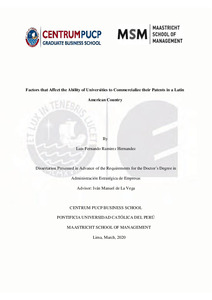| dc.contributor.advisor | Vega, Iván Manuel de la | |
| dc.contributor.author | Ramírez Hernandez, Luis Fernando | |
| dc.date.accessioned | 2020-03-26T20:32:55Z | |
| dc.date.available | 2020-03-26T20:32:55Z | |
| dc.date.created | 2020-03 | |
| dc.date.issued | 2020-03-26 | |
| dc.identifier.uri | http://hdl.handle.net/20.500.12404/16163 | |
| dc.description.abstract | The main purpose for this study was to find out which factors at the university level
affect the ability to commercialize their invention patents in a Latin American country.
Twenty-one Colombian universities participated in this study. The information was treated by
the Partial Least Squares regression (PLS) path model. The primary information was obtained
from the application of a survey to a random sample of 87 invention patents, whose holder is
a Colombian university. Of the answers received, the one that generates the most concern is
the fact that almost 80% of patents of invention have not been commercialized. This
discovery is new for the Colombian case and it is something for which until now there was no
scientific evidence. This not only questions the effectiveness of the country's Innovation
System, but also forces to review the processes of scientific research and patenting carried out
by universities. It demonstrates weaknesses in academic entrepreneurship to the extent that
scientific research is not producing commercial applications capable of generating revenue
and incomes for those universities. For its part, the determination level R² values of the
endogenous constructs considered substantial the variable Closeness to the market (58.8%)
which turns out to be the most determining factor in order to achieve an effective
commercialization of patents in this country. This explains the poor ability of Colombian
universities to commercialize their patents and it gives the management of innovation and
university research the challenge of promoting the "exploitation of knowledge" through three
strategies: 1) better market research; 2) strengthening relations with industry; and 3) the prior
identification of the real possibilities of commercialization of its innovations. | es_ES |
| dc.description.abstract | El objetivo principal de este estudio fue descubrir qué factores a nivel universitario
afectan la capacidad de comercializar sus patentes de invención en un país latinoamericano. 21
universidades colombianas participaron en este estudio. La información se trató mediante el
modelo de regresión de mínimos cuadrados parciales (PLS). La información primaria se obtuvo
de la aplicación de una encuesta a una muestra aleatoria de 87 patentes de invención, cuyo
titular es alguna universidad colombiana. De las respuestas recibidas, la que genera mayor
preocupación es el hecho de que casi el 80% de las patentes de invención no se han
comercializado. Este descubrimiento es nuevo para el caso colombiano y es algo para lo que
hasta ahora no había evidencia científica. Esto no solo cuestiona la efectividad del Sistema de
Innovación del país, sino que también obliga a revisar los procesos de investigación científica
y patentes llevados a cabo por las universidades. Ello demuestra debilidades en el espíritu
empresarial académico en la medida en que la investigación científica no está produciendo
aplicaciones comerciales capaces de generar ingresos para esas universidades. Por su parte, los
valores del nivel de determinación R² de las construcciones endógenas considera sustancial la
variable Cercanía al mercado (58.8%) que resulta ser un factor determinante para lograr una
comercialización efectiva de patentes en este país. Esto explica la escasa habilidad de las
universidades colombianas para comercializar sus patentes y entrega a la gerencia de la
innovación e investigación universitaria el desafío de impulsar la "explotación del
conocimiento" a través de tres estrategias: 1) una mejor investigación de mercado; 2) el
fortalecimiento de las relaciones con la industria; y 3) la identificación previa de las
posibilidades reales de comercialización de sus innovaciones. | es_ES |
| dc.language.iso | eng | es_ES |
| dc.publisher | Pontificia Universidad Católica del Perú | es_ES |
| dc.rights | info:eu-repo/semantics/openAccess | es_ES |
| dc.rights.uri | http://creativecommons.org/licenses/by-nc-nd/2.5/pe/ | * |
| dc.subject | Patentes de invención | es_ES |
| dc.subject | Universidades--América Latina | es_ES |
| dc.title | Factors that affect the ability of universities to commercialize their patents in a latin american country | es_ES |
| dc.type | info:eu-repo/semantics/doctoralThesis | es_ES |
| thesis.degree.name | Doctor en Administración Estratégica de Empresas | es_ES |
| thesis.degree.level | Doctorado | es_ES |
| thesis.degree.grantor | Pontificia Universidad Católica del Perú. CENTRUM | es_ES |
| thesis.degree.discipline | Administración Estratégica de Empresas | es_ES |
| renati.advisor.cext | 001524411 | |
| renati.advisor.orcid | https://orcid.org/0000-0002-8554-0510 | es_ES |
| renati.author.cext | PE102012 | |
| renati.discipline | 413038 | es_ES |
| renati.level | https://purl.org/pe-repo/renati/level#doctor | es_ES |
| renati.type | http://purl.org/pe-repo/renati/type#tesis | es_ES |
| dc.publisher.country | PE | |
| dc.subject.ocde | https://purl.org/pe-repo/ocde/ford#5.02.04 | es_ES |






